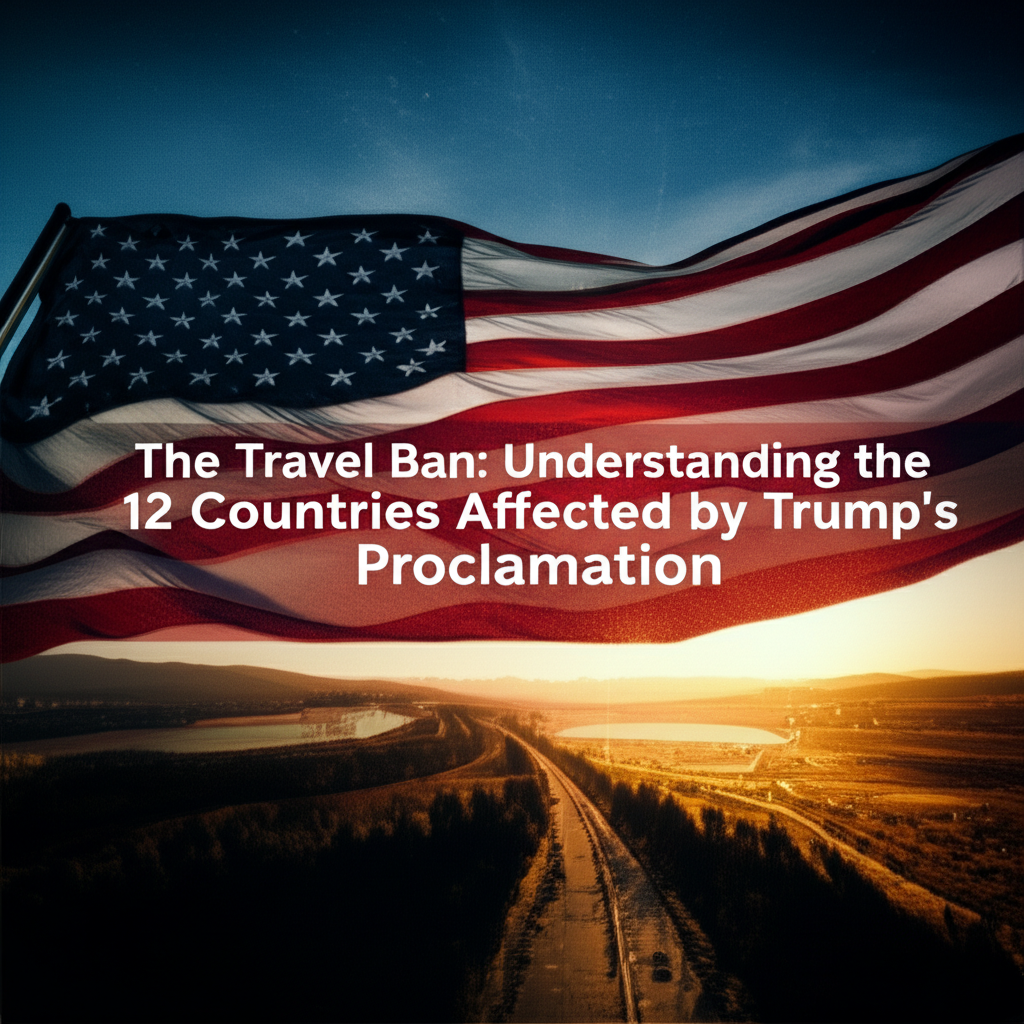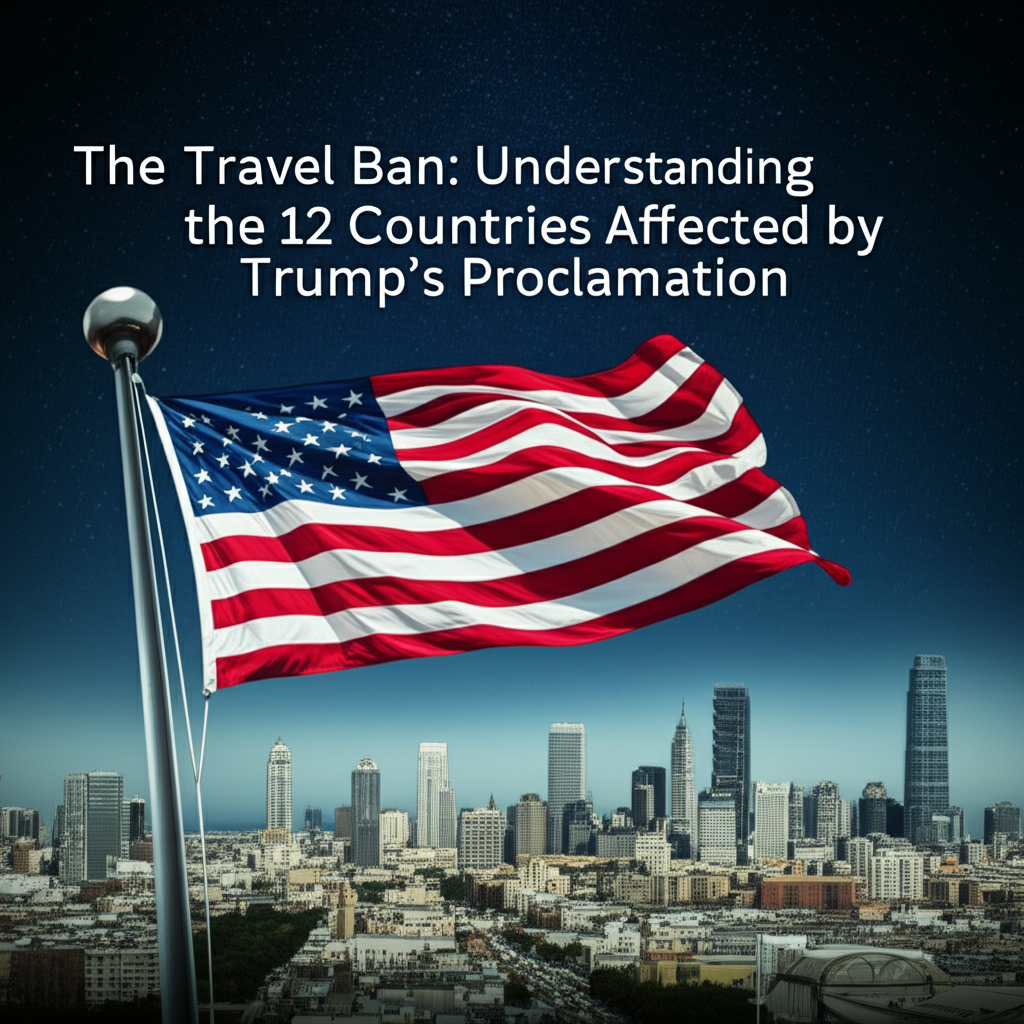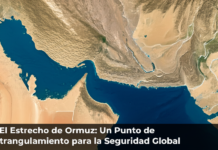Contents
US Travel Ban Sparks Global Outrage and Uncertainty

Trump Travel Ban:
The Travel Ban: Understanding the 12 Countries Affected by Trump’s Proclamation
In a move that has sparked controversy and debate, US President Donald Trump has issued a proclamation implementing a travel ban on nationals from 12 countries deemed to pose a national security risk. The proclamation, which was announced earlier this month, aims to restrict and limit the entry of individuals from these countries into the United States.
A Growing Concern: National Security Risks
The White House has cited national security concerns as the main reason for the travel ban. According to the administration, the 12 countries are deficient in screening and vetting protocols, making them vulnerable to potential threats. This claim is supported by data from the Fiscal Year 2023 DHS Entry/Exit Overstay Report, which reveals that Afghan nationals had a 9.70% overstay rate for business/tourist visas, while Myanmar had an overstay rate of 42.17% for student and vocational visa categories.
A Look at Each Affected Country
So, which countries have been affected by the travel ban? Let’s take a closer look:
* Afghanistan: The US has designated Afghanistan as a country with no effective central authority to handle passport issuance or civil documentation. This lack of oversight makes it challenging for the US government to verify the identity and background of Afghan nationals.
* Myanmar
* Chad: Chad has been identified as a country with inadequate B1/B2 visa overstay rates, with 49.54% of visa holders overstaying their stay. The country’s high F, M, and J visa overstay rate further highlights its lack of effective screening and vetting protocols.
* Republic of the Congo: The Republic of the Congo has been criticized for its high B1/B2 visa overstay rate, with 29.63% of visa holders overstaying their stay. The country’s academic-related visas also have a high overstay rate, with 35.14% of F, M, and J visa holders overstaying their stay.
* Equatorial Guinea: Equatorial Guinea has been identified as a country with inadequate B1/B2 visa overstay rates, with 21.98% of visa holders overstaying their stay. The country’s academic-related visas also have a high overstay rate, with 70.18% of F, M, and J visa holders overstaying their stay.
* Eritrea: Eritrea has been criticized for its lack of effective screening and vetting protocols, making it difficult to verify the identity and background of Eritrean nationals. The country’s B1/B2 visa overstay rate is also high, with 20.09% of visa holders overstaying their stay.
* Haiti: Haiti has been identified as a country with inadequate B1/B2 visa overstay rates, with 31.38% of visa holders overstaying their stay. The country’s academic-related visas also have a high overstay rate, with 25.05% of F, M, and J visa holders overstaying their stay.
* Iran: Iran has been designated as a country that supports terrorist activities, making it a prime target for the travel ban. The US government has cited Iran’s non-cooperation with American authorities in identifying potential security threats as one of the main reasons for the ban.
* Libya: Libya has been identified as a country with inadequate B1/B2 visa overstay rates, with 49.54% of visa holders overstaying their stay. The country’s academic-related visas also have a high overstay rate, with 55.64% of F, M, and J visa holders overstaying their stay.
* Somalia: Somalia has been identified as a country with inadequate screening and vetting protocols, making it vulnerable to potential threats. The US government has cited Somalia’s persistent terrorist threat emanating from its territory as one of the main reasons for the ban.

* Sudan: Sudan has been criticized for its lack of effective screening and vetting protocols, making it difficult to verify the identity and background of Sudanese nationals. The country’s B1/B2 visa overstay rate is also high, with 9.83% of visa holders overstaying their stay.
* Yemen: Yemen has been identified
A Partial Travel Ban: Seven Additional Countries
In addition to the 12 countries already affected by the travel ban, President Trump has also partially restricted travel from seven other countries deemed to pose a high level of risk to the United States. These countries include:
* Burundi: Burundi has been identified as a country with inadequate B1/B2 visa overstay rates, with 15.35% of visa holders overstaying their stay.
* Cuba: Cuba has been designated as a state sponsor of terrorism, making it a prime target for the travel ban. The US government has cited Cuba’s non-cooperation with American authorities in accepting back its removable nationals as one of the main reasons for the ban.
* Laos: Laos has been identified as a country with inadequate B1/B2 visa overstay rates, with 34.77% of visa holders overstaying their stay.
* Sierra Leone: Sierra Leone has been criticized for its lack of effective screening and vetting protocols, making it difficult to verify the identity and background of Sierra Leonean nationals. The country’s B1/B2 visa overstay rate is also high, with 15.43% of visa holders overstaying their stay.
* Togo: Togo has been identified as a country with inadequate B1/B2 visa overstay rates, with 19.03% of visa holders overstaying their stay.
* Turkmenistan: Turkmenistan has been criticized for its lack of effective screening and vetting protocols, making it difficult to verify the identity and background of Turkmen nationals. The country’s F, M, and J visa overstay rate is also high, with 21.74% of visa holders overstaying their stay.
* Venezuela: Venezuela has been identified as a country with inadequate B1/B2 visa overstay rates, with 9.83% of visa holders overstaying their stay.
A Complex Issue
The travel ban is a complex issue that raises many questions about national security, immigration policies, and the role of government in ensuring public safety. While the US government argues that the ban is necessary to protect American citizens from potential threats, critics argue that it unfairly targets certain countries and communities.
As we move forward, it’s essential to have an open and nuanced discussion about the travel ban and its implications for national security, immigration policies, and global relations. By examining the facts and data behind this policy, we can work towards creating a more informed and equitable conversation about the challenges facing our country today.
A Call to Action
The travel ban is a prime example of how complex issues can arise when policymakers balance competing priorities and interests. As we move forward, it’s crucial to prioritize transparency, accountability, and inclusive decision-making processes that address the concerns and needs of all stakeholders involved.
In the spirit of open dialogue, I invite readers to share their thoughts on this issue and explore ways in which we can work together to build a more just and equitable society for all.












































 Online casino
Online casino